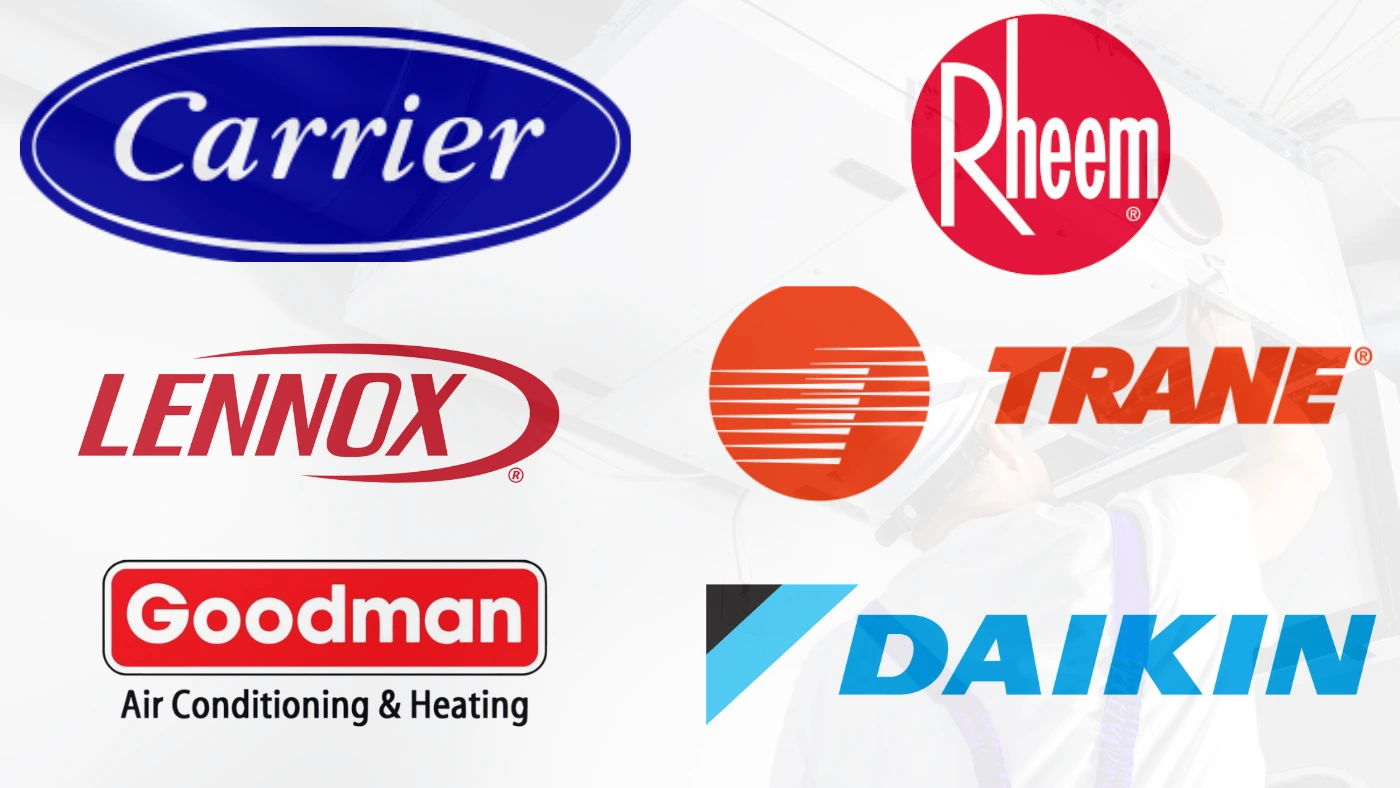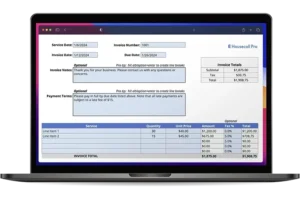
Want to see your potential revenue?
See what businesses like yours earn with Housecall Pro in 1 - 2 minutes.

Choosing the right HVAC brands can make a big difference in your quality of work—and your customers’ satisfaction. You want to pick products that perform well, hold up over time, and make your installs fast and easy. But with so many HVAC brands available, it can be difficult to know which to use and where to source them.
This guide covers the top HVAC manufacturers and suppliers as well as other helpful tips to choose the best companies to partner with. We’ve split the guide into two parts—brands and suppliers—for easier navigation.
Top HVAC Manufacturers
Here’s a quick look at the top HVAC manufacturers in the U.S.
The table below compares each HVAC manufacturer on key details. We’ll expand in the sections below.
| Manufacturer | Years in Business | Key Strengths | Coverage |
|---|---|---|---|
| Carrier | 120+ | Smart, energy-efficient systems | Nationwide |
| Trane | 110+ | Durability, strong warranties | Nationwide |
| Lennox | 125+ | Broad product range, strong U.S. presence | Nationwide, plus Canada |
| Rheem | 100+ | Quiet, efficient systems; low repair rates | Nationwide |
| Daikin | 100+ | Global leader, innovative, energy-saving tech | Global |
| Goodman | 40+ | Affordable, reliable, solid warranties | Nationwide, plus Canada |
Top HVAC Suppliers
Here’s a quick look at the top HVAC suppliers.
- Ferguson
- Johnstone Supply
- Reece
- Winsupply
- Trane Supply
- Carrier Enterprise
- Lennox Stores (Parts Plus)
The table below compares each HVAC supplier on key metrics. We’ll go into more detail below.
| Supplier | Brands Carried | Coverage |
|---|---|---|
| Ferguson | Carrier, Trane, Goodman, Mitsubishi + others | Nationwide |
| Johnstone Supply | Carrier, Goodman, Bosch, Daikin, Bryant + others | Nationwide, plus Canada |
| Reece | Mitsubishi, Rinnai, Braemar, Haier + others | U.S., Australia, New Zealand |
| Winsupply | Bosch, LG, Johnson Controls brands | Nationwide |
| Trane Supply | Exclusively Trane | Nationwide, plus Canada |
| Carrier Enterprise | Carrier, Bryant, Pane | U.S., Puerto Rico, Canada, Latin America, and the Caribbean |
| Lennox Stores | Exclusively Lennox | Nationwide, plus Canada |
Compare the best HVAC manufacturers
The right HVAC manufacturer depends on your business priorities and clientele. For example, you might recommend Carrier to eco-conscious homeowners looking for smart, energy-efficient systems, while Trane could be a better fit for companies that want long-term durability and minimal maintenance. We recommend choosing brands known for long-lasting equipment, strong warranties, and responsive customer support.
1. Carrier
Founded by Willis Carrier, the inventor of modern air conditioning, Carrier has been a pioneer in HVAC innovation since 1902. Today, it’s known worldwide for energy-efficient, smart, and environmentally friendly systems.
Top product lines:
- Infinity Series (high SEER, air purification, quiet operation)
- Geothermal heat pumps
Known for: Industry-first innovations like variable-speed compressors, hybrid heat systems, and Puron, a chlorine-free R-410A refrigerant
Availability: Nationwide through a large network, including Carrier Enterprise and Ferguson HVAC
2. Trane
Trane started out as a small, family-run plumbing business but became more well-known with the invention of the Trane Vapor Heating System in 1913. The company initially focused on heating systems and specialty heating equipment but later expanded into residential and commercial cooling, earning a reputation for durable products and top-notch engineering.
Top product lines:
- Residential heat pumps ( XR14, XR15, XL17i, XV18, XV19, and XV20i models)
- Residential ductless mini-split AC systems
Known for: Durable build quality, excellent system longevity, and one of the best warranties in the industry
Availability: 200+ Trane retail locations and certified distributors like Ferguson
3. Lennox
Founded in 1885, Lennox has a strong reputation for corporate responsibility and sustainability, having received multiple Dealer Design Awards and a Good Design Award for its heat pump technology.
Top product lines:
- Three price-point-tiered lines of central air conditioners: Merit, Elite, and Signature
- Heat pump models with high Seasonal Energy Efficiency Ratio (SEER) and Heating Seasonal Performance Factor (HSPF) ratings
Known for: Commercial rooftop units, residential ductless mini-splits, Energy Star certification, iComfort smart thermostats, and Quantum Coil technology
Availability: 200+ distribution facilities known as Lennox Stores (formerly Lennox PartsPlus stores) in 42 states and 8 Canadian provinces, plus 9 regional distribution centers
4. Rheem
Founded in 1925, Rheem is a leader in budget-friendly, high-quality heating and cooling appliances. In 1988, Rheem became a wholly owned subsidiary of Paloma Industries of Japan, one of the world’s leading producers of gas appliances.
Top product lines:
- Endeavor® Line (gas furnaces, air handlers, split and packaged air conditioners, split and packaged heat pumps, and packaged gas-electric units)
- Floating Air™ Ductless Mini-Split Systems
- EcoNet® Smart Monitoring System
- Triton™ Commercial Gas Water Heaters
Known for: Sustainability, including reusing factory materials
Availability: Major wholesalers including Ferguson, Gemaire Distributors, Gustave A. Larson, F.W. Webb, Baker Distributing, and Southern Pipe & Supply
5. Daikin
Founded in Osaka, Japan, in 1924, Daikin is known for its advanced technologies, particularly its proprietary inverter compressors. The company is also committed to environmental sustainability, with an emphasis on using eco-friendly refrigerants.
Top product lines: Daikin Fit and Daikin Aurora models featuring high SEER and HSPF ratings
Known for: Pioneering inverter technology, allowing HVAC systems to adjust compressor speed to precisely match heating and cooling needs
Availability: Wholesale distributors including Stevens Equipment Supply (AZ, CO, MN, NM, ND, WI, and UT), Mar-Hy Distributors, and Ferguson
6. Goodman
Founded in 1975 in Houston, Texas, Goodman has a reputation for providing affordable and reliable HVAC systems. The company puts an emphasis on value, with long-lasting products, high-quality components, and robust warranty protection.
Top product lines:
- Smart technology products
- ComfortBridge Technology
- Goodman GTST Connected Thermostat
Known for: Reliable and efficient HVAC solutions at a competitive price point
Availability: Johnstone Supply and HD Supply; limited availability at Lowe’s retail stores
How to choose the right HVAC manufacturer
The HVAC brands you sell will reflect on your business and professional reputation, so it’s important to choose wisely. Start by evaluating your business needs—do you serve primarily residential clients, commercial properties, or both? Then, do some market research to understand which brands your target customers like. You should also determine your customers’ average budget and look for reliable equipment within that range so you don’t price yourself out of the market.
Product reliability and performance
Each brand offers different warranties. Some offer comprehensive parts and labor warranties, while others may only cover specific components or offer shorter terms. Take time to review the warranty details for each product you install so you can clearly communicate coverage and limitations to your customers.
To evaluate reliability, consult objective sources such as Consumer Reports, EnergyStar.gov, and third-party industry studies. You can also browse professional forums like ContractorTalk.com to see what other HVAC technicians are saying about product performance. Pay attention to patterns, such as models with a history of breakdowns or service issues.
If you partner with a reputable brand, like Carrier, Lennox, or Rheem, highlight it on your website to strengthen your reputation.
Energy efficiency and innovation
Today’s customers are increasingly interested in HVAC systems that offer both energy savings and smart technology. However, consider your local market. Technicians in areas with a lot of new-build homes often see higher demand for smart-integrated equipment. To meet those expectations, look for manufacturers known for eco-friendly design, high-efficiency performance, and seamless integration with popular smart home systems like Alexa, Google Assistant, or Siri.
In contrast, carrying a lot of high-tech products might not be practical—or profitable—if your customers primarily live in older homes, as their houses may need to be rewired to take advantage of smart integration features. Make sure you understand your target customers’ needs and tailor your stock accordingly.
Climate should also play a role in the products you carry. If you’re operating in a hot, humid area like Texas, look for air conditioning brands with high SEER ratings. If you’re in a colder climate like Minnesota, prioritize carrying high-efficiency furnaces and heat pumps that perform reliably in sub-freezing conditions.
Support, training, and contractor loyalty programs
Ask about brand-sponsored complimentary training, like Carrier’s Carrier University or Trane’s ComfortSite. Perks like these can make onboarding new techs and apprentices easier. Plus, getting your technicians brand-certified boosts your credibility.
Many manufacturers also offer exclusive discounts, rebates, or preferred pricing to contractors who primarily sell their products. These programs can improve your margins and give you room to offer competitive pricing—helping you win more jobs without sacrificing profits.
Not sure how to structure your pricing? Use Housecall Pro’s free calculators to estimate equipment markups, labor costs, and net profit.
Availability through distribution partners
Before committing to a brand, make sure it’s readily available through nearby distributors. A quick online search should yield your nearest HVAC suppliers. Be sure to compare hours, delivery timelines, and whether emergency parts are available after-hours. While inventory management software can help you track stock levels and reorder parts proactively, it’s good to know who to call when you need something quickly.
If you’re in a major metro area, distribution and availability may not be a huge consideration. But if you’re in a remote or rural region, fewer supply hubs can mean slower deliveries and higher shipping costs, which eat into your margins. Make sure to factor in location, shipping fees, and restocking timelines when evaluating which brands make the most sense for your business.
Compare the best HVAC suppliers and distributors
The right supplier can make a big difference in how your business operates. Good suppliers will offer competitive pricing, keep you up-to-date about product or manufacturer changes, and provide the support you need to meet tight deadlines and customer demands.
If fast delivery and access to emergency parts are priorities, look for distributors with extended hours and local inventory. If personal service matters more, choose suppliers who communicate proactively and help you stay ahead of potential shortages.
1. Ferguson
Ferguson has a wide range of heating and cooling products, including unitary and ductless equipment, accessories, controls, and service parts. It has a large network of locations and distribution centers to serve customers in most parts of the country.
Brands carried: Ruud, Trane, Day & Night, Goodman, American Standard, Carrier, Mitsubishi Electric, Daikin, Bryant, Fujitsu, and Oxbox
Notable support offerings: Training and product consultation; online tools for warranty claims and order pickup; same-day delivery in many markets
2. Johnstone Supply
Johnstone Supply is known for being a reliable, well-stocked distributor with an extensive catalog and strong technical expertise. It has 450+ stores in the U.S. and Canada, and six distribution centers: Portland, OR; Las Vegas, NV; Dallas, TX; Joliet, IL; Allentown, PA; and Jacksonville, FL.
Brands carried: Coleman Heating and AC, Goodman, Bosch, Fujitsu, Daikin, Airquest, Arcoaire, Bryant, Carrier, Comfortmaker
Notable support offerings: Multiple ways to order, including through its PartStock app
3. Reece
Reece started in Australia and has grown to a major supplier for all of Australia, New Zealand, and the U.S. The brand carries plumbing equipment and supplies, plus equipment for pools and irrigation, HVAC, fire protection, and refrigeration.
Brands carried: Kaden, Braemar, Brivis, Mitsubishi Heavy Industries (MHI), Teco, Bonaire, Mitsubishi Electric, Rinnai, and Haier
Notable support offerings: Reece’s online business management system, maX, provides real-time product information and pricing, detailed order management, and delivery and pickup options
4. Winsupply
Winsupply’s “Spirit of Opportunity” business model involves forming equity partnerships with local wholesale businesses. It operates a network of over 660 “Win-branded” local companies across 45 states, alongside acquired regional suppliers such as Noland Company, Carr Supply, and APCO, as well as six regional distribution centers: Dayton, Denver, Middletown (CT), Richmond, Jacksonville, and Oklahoma City.
Brands carried: Bosch, LG Electronics, Uponor, and Johnson Controls Unitary Products Group
Notable support offerings: Winsupply’s Stock 360, a web-based platform, manages inventory, inventory investment, and automates recurring parts ordering
5. Trane Supply
Trane Supply, a subsidiary of Trane Technologies, exclusively distributes Trane HVAC parts, supplies, and replacement equipment for residential and commercial heating and air conditioning systems. There are 650+ store locations across the United States and Canada.
Brands carried: Trane Supply only carries Trane brand HVAC and refrigeration products and parts
Notable support offerings: 24/7 online ordering system, customer support available via phone, chatbot, or email, and 1,000+ self-service articles available online
6. Carrier Enterprise
Carrier Enterprise (CE) exclusively distributes Carrier brand heating, ventilation, and air conditioning (HVAC) equipment, parts, supplies, and solutions across North America.
Brands carried: Carrier and its subsidiaries: Carrier, Bryant, and Payne
Notable support offerings: CE Mid-Atlantic provides technical support exclusively to licensed technicians, with over 150 locations
7. Lennox Stores (PartsPlus)
Lennox Stores distributes the complete selection of Lennox brand residential and light commercial HVAC equipment, universal parts, indoor air quality products, and repair and installation accessories.
Brands carried: Only Lennox brand HVAC equipment and parts
Notable support offerings: Order parts online or call the toll-free number; tech support and troubleshooting are available 24/7
How to choose an HVAC supplier
Start by assessing your business needs. Identify which brands your customers request most often, then gather quotes from multiple nearby suppliers. Ask about warranty coverage, delivery timelines, and whether they stock aftermarket parts like replacement coils, motors, or control boards.
Small HVAC businesses may not qualify for bulk-buying discounts, but many suppliers offer other savings, such as loyalty discounts or incentives for paying cash or settling invoices within 10 days. You may also be able to negotiate lower pricing for equipment featured in your flat-rate services.
Product availability and brand access
If you operate in a larger city, you’ll likely need a supplier that carries a wide range of brands and models—not just one exclusive brand. If your customers frequently request a brand that your current supplier doesn’t carry, it might be time to switch or partner with an additional distributor.
Make sure you get consistent pricing. Fluctuating costs can make your quotes less reliable and impact your profitability. If you’re struggling to get estimates right, try Housecall Pro’s estimating tool to keep your bids profitable and competitive.
Shipping speed and order logistics
Suppliers with multiple delivery options can make your job a lot easier. For example, Johnstone Supply’s PartsStock app allows you to order parts directly from the field, saving valuable time. Smaller suppliers may only accept orders over the phone or through a cumbersome ordering sheet.
Local support, training, and service
Some suppliers, such as Carrier Enterprises and Trane Supply, offer in-house training and technical support. This reduces the time you have to spend onboarding technicians or troubleshooting in the field.
Online ordering and account tools
Look for suppliers with ordering options that match your preferences—whether that’s placing orders online or directly through a rep. If you use Housecall Pro, ask your suppliers if their systems integrate with our software to streamline ordering and inventory management.
HVAC manufacturer vs. supplier: Who should you contact first?
When starting an HVAC business, it’s best to contact local suppliers first. They’re more familiar with your local market and can advise you on which brands, models, and price points sell best in your area. Suppliers can also help you set up accounts, access training, and understand order logistics—key details when you’re just getting started.
There’s one exception: If you’re already working with a supplier and run into service or supply issues that aren’t resolved, you may need to escalate the issue directly to the manufacturer.
Are you spending more time estimating jobs and tracking inventory than actually growing your business and taking care of customers? Housecall Pro simplifies everything from ordering to estimating—so you can focus on what matters. Contact us today for a free 14-day trial.
FAQ
-
What’s the difference between an HVAC manufacturer and supplier?
-
HVAC manufacturers create and build systems like furnaces, air conditioners, and ventilation units, often specializing in residential, commercial, or industrial products. HVAC suppliers buy these products in bulk and sell them to businesses, sometimes offering extra services like product guidance, logistics, and inventory support.
-
Are HVAC manufacturers also suppliers?
-
No, HVAC manufacturers are not usually suppliers. However, some large manufacturers—such as Carrier, Trane, and Lennox—have subsidiary suppliers. Carrier Enterprise, Trane Supply, and Lennox Stores are examples.
-
Where do I buy HVAC equipment?
-
You can buy HVAC equipment from suppliers that sell wholesale products to licensed contractors. Some may require proof of licensure; others may be more flexible. Try searching “HVAC suppliers near me” or explore the recommended suppliers in this guide.
-
Is it better to go through a national or local supplier?
-
Whether it’s best to go through a local or national supplier depends which products you need and who has them in stock. National suppliers often have more buying power and inventory, while local suppliers may offer more personal service and quicker delivery. Winsupply is an example of a national supplier with a large local network. Ultimately, choose the supplier that offers the best mix of value, service, and availability for your business.
Get In Touch: 858-842-5746
Let us earn your trust
On average, Pros increase monthly revenue generated through Housecall Pro by more than 35% after their first year.
See plan options and feature breakdown on our pricing page.
HVAC suppliers are the middlemen. They buy equipment and parts in bulk from manufacturers and sell them to businesses like yours. Most suppliers work with specific brands, so you may need to partner with more than one to get access to all the products you offer.
Many suppliers also offer additional services, including assistance with product selection, logistics, and inventory management.







